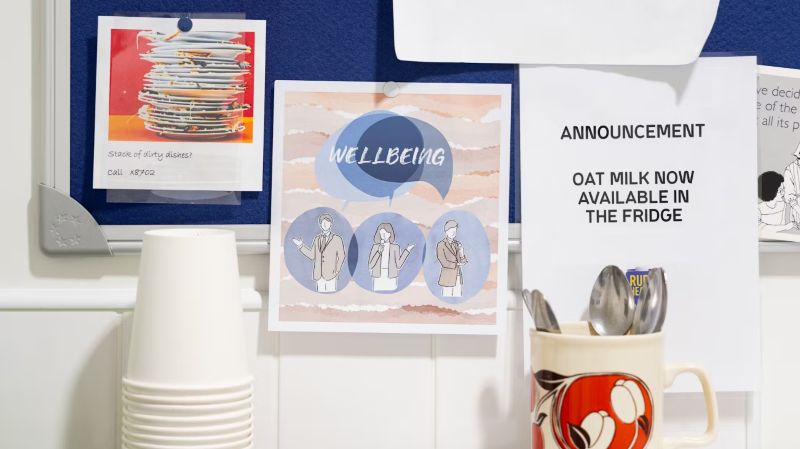
Caroline Butterwick reflects on times when she’s felt excluded at work, unable to be honest about her experiences of severe mental ill health. And she asks what needs to change if workplace wellbeing is to become more meaningful.

By Caroline Butterwick
Writer, researcher and freelance journalist

Steven Pocock
Photographer
Introduction
Sitting in a cramped boardroom, I listened to my colleagues talk about “mental health awareness”. As we read through a document about mental illness, a senior manager said something to the effect of, “Well, not all of this applies to our company. It mentions people who are suicidal or have psychosis.”
I shuffled awkwardly in my seat, wondering whether I should say something. It was less than a year since my last hospital admission. I realised then that – in a session all about understanding mental health – people like me weren’t expected to be at the table.
Mental health awareness in the workplace is increasingly in vogue. I’ve been in offices where wellbeing initiatives range from a bowl of free fruit to monthly yoga sessions, as if doing downward dog would cure you of deadlines and office gossip.
While I’m glad that discussions about things like anxiety and mild depression are more commonplace, people like me often feel left out of the conversation. I still have to hide that I have severe mental illness. I have worried about being judged or even losing my job.
Meaningful Mental Health Awareness
How we feel at work is often influenced by our working conditions. The NHS lists some of the main contributors to work-related stress, including lack of control over our workload, high demands on our time, lack of clarity about responsibilities, fear of redundancy, poor line management, bullying, harassment and discrimination.

“I’ve been in offices where wellbeing initiatives range from a bowl of free fruit to monthly yoga sessions.”
If employers want to support wellbeing, tackling issues within the workplace is essential. Wellbeing schemes – however well-intentioned – often feel like a sticking plaster over faulty workplaces and unrealistic workloads.
“It’s crucial that employers create an effective working environment where employees feel comfortable disclosing poor mental health and taking time off if they need to,” says Jonathan Stuart, Workplace Partnerships Lead at the mental health charity Mind.
Jonathan believes employers have a duty to be empathetic and person-centred. He told me that “tangible measures like flexible working hours, generous annual leave, and access to confidential support lines can make a positive difference”.
I also asked UNISON Assistant General Secretary Jon Richards about workplace wellbeing schemes and how they could be made more meaningful. “Mental health issues continue to be underplayed in many workplaces, often because staff fear being stigmatised or not taken seriously,” he told me. “While some employers offer perks such as gym discounts, free access to wellness apps, or other benefits, these aren’t enough.”
How do we truly support workers’ mental health? Jon believes it’s about having a clear workplace mental health plan in place, with effective standards to prevent ill health, and help on offer for people returning after a period of absence. “Open conversations about mental health should be encouraged, and support offered to those who’re struggling,” he says. “Staff wellbeing should also be consistently monitored and problems addressed when issues arise.”
When It Goes Well
I have had some good experiences at work where I’ve felt valued and supported. The best was a job where my line manager would meet me for a coffee each morning for a few weeks after I’d been off sick. We’d talk about my workload for the day, but it was also a chance to just catch up. I felt like I mattered as a person.

“While some employers offer perks such as gym discounts, free access to wellness apps, or other benefits, these aren’t enough.”
She proactively researched support and, with my agreement, printed out a wellness action plan from Mind that we went through together. She listened to my thoughts about what would help. To me, this showed someone who genuinely cared and wanted me to feel supported. I wasn’t made to feel guilty for taking time off, as I have in other roles.
I asked a few friends what would help their mental health at work. Improved working conditions, less pressure and a better work–life balance were top of most people’s lists. Not being chastised for needing time off for counselling is more important than being able to download a mindfulness app.
Who Is Left Behind
As well as failing to address real issues within workplaces, wellbeing schemes also often ignore people with more severe mental illness. It’s one thing to say you struggle with anxiety while you prep for a presentation – chances are, your colleagues will be supportive and offer you empathy and advice. Walking into a staff canteen, I’d never say, “The smell of the food cooking reminds me of mealtimes when I was sectioned in hospital.” Maybe I should, but I don’t think that’s the kind of pleasant lunchtime conversation colleagues are hoping for.
Of course, this isn’t just a workplace problem, it’s part of a bigger conversation about mental health that feels like it only has room for anything ‘mild’. The charity Rethink Mental Illness argues that, while attitudes to more common mental health conditions have improved, people with severe mental illness continue to face widespread discrimination.
I remember telling a colleague I struggled with my mental health. She nodded and then whispered, “Me too! I once even had to take antidepressants.” I was glad she felt able to open up to me about this, but I sensed that I couldn’t share my own experiences.
Perhaps it’s up to people like me to widen the conversation further. I am still unwell, still medicated, but there is also some distance between me now and the version of me who was hospitalised. Maybe I should share more.
If I could go back to that mental health awareness session where a manager said, “There’s no one at this company like that,” when talking about suicide and psychosis, I could have said something rather than bite my tongue. But is this really my job?
Originally published by Wellcome Collection, 02.05.2025, under the terms of Creative Commons Attribution 4.0 International license.







